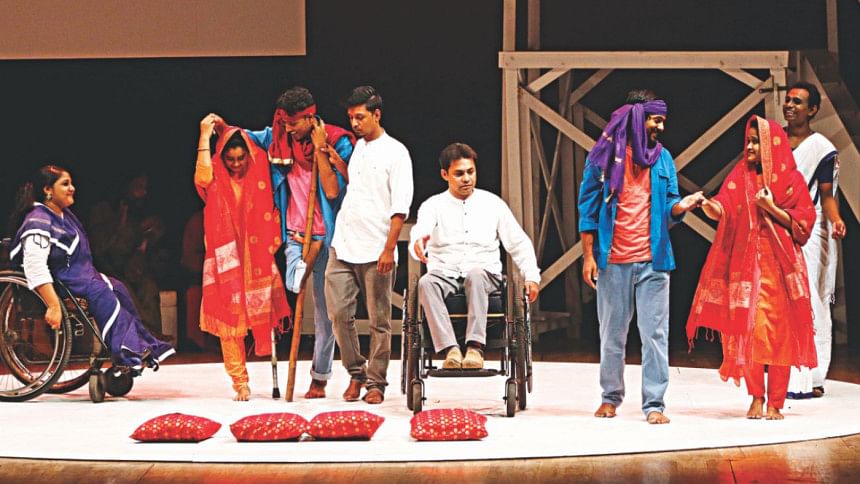“A Different Romeo and Juliet” staged at BSA

Taking centre-stage at Bangladesh Shilpakala Academy's National Theatre Hall on Tuesday evening was a tragedy oft retold over centuries. The story of Romeo and Juliet -- young, star-crossed lovers torn apart by a history of family feuds -- has become the universal archetype for ill-fated romance. However, in a brilliant theatrical display titled "A Different Romeo and Juliet", a cast of differently-abled actors cleverly wove the powerlessness of the tragic lovers to their own fates.
The production was an initiative taken by The British Council Bangladesh, in association with Graeae Theatre Company, UK, and Dhaka Theatre from Bangladesh. Directed by Jenny Sealy and produced by Nasiruddin Yousuff, the actors are drawn from CRP Bangladesh, BRAC, the BRIDGE Foundation and Gram Theatre. The cast members include Rabbi Mia and Tayfur Rahman Roman (sign language) as Romeo, Shakila Jafar and Jannatul Ferdous Srity (sign language) as Juliet, as well as Md. Saddam Hossain, Afsaruddin Riyad, Md. Shariful Islam, Md. Mostafizur Rahman Sajal, Md. Murshed Miah, Mohammad Monir Hossain Sikder, Parveen Akter, Md. Sharif Hasan Chowdhury, Mohua Akter Mukta, Mur Islam Ripon, Md. Shaheb Ali, Baul Abdul Kafi and Sri Shantosh Chandra Barman in other roles.
The adaptation juxtaposes the Shakespearean masterpiece in a Bangladeshi reality. Set in modern-day Dhaka, the feuding Capulet and Montague family is replaced here by the Khans and Chowdhurys. The first act opens to a cricket match between the Khan Elevens and Chowdhury Elevens, establishing their rivalry and desire to dominate the other, before taking us to a traditional Dhakaiya wedding scene where Romeo meets Juliet for the first time, sealing their fates.
The most striking feature of the play, however, was the shadowing role of each character, save for the roles of Benvolio and Juliet's mother. Every scene and dialogue is simultaneously mirrored in sign language by another cast member playing the same role, making the play comprehensible for audibly-impaired viewers. With each member possessing a different ability, the mirroring actors assist each other to create beautiful, fluid transitions between actions.
The abilities of the cast members also resulted in other interesting depictions straying from the original narrative. The balcony scene in which the ardent Juliet famously ponders, "O Romeo, Romeo, wherefore art thou, Romeo?" --is reversed as Juliet reclines upon the ground and Romeo ascends the elevated platform on the stage. The set design was kept simple, with only the elevated platform to enact the balcony scene, and a screen in a corner of the stage showing the lines delivered by the actors in text.
The most poignant moment arrived at the play's denouement, when the Khan and Chowdhury families reconciled over the bodies of Romeo and Juliet. Juliet's mother then turned to the audience and asked, "Are they not people? Do we not love? Don't we have the desire to be loved?"
The sadness is palpable as the play draws us out of the Shakespearean narrative, and leads us to examine the plight of the differently-abled in our society.

 For all latest news, follow The Daily Star's Google News channel.
For all latest news, follow The Daily Star's Google News channel. 



Comments